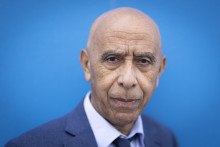Last summer, the UT decided to lower tuition fees for Ukrainian student refugees, equating it to the statutory tuition fee of 2,209 euros. This is the amount paid by Dutch students, being much lower than the institutional fee that normally applies to students from outside the European Economic Area (EEA). The immediate cause for this decision was the Russian invasion of Ukraine. Besides Ukrainians, refugee students from other countries are also eligible for the reduced tuition fees provided they have a temporary protected status.
Other Dutch universities and colleges took similar measures last summer. As it seems like the war in Ukraine is not ending any time soon, the Executive Board wants to extend the measures by one academic year, says Karin Dirksen (policy advisor internationalisation). By doing so, the Board anticipates a meeting of the Dutch university association UNL next Friday, where a possible extension of the reduced tuition fees will be discussed.
Limited numbers
The number of refugee students varies greatly by university, Dirksen knows. In Amsterdam, it involves several hundred students, while at the UT only five students are using the reduced fee this academic year. ‘In Twente, the numbers are small. For 2023-2024, we don't suddenly expect hundreds of students here either. That makes it financially possible.’
Previously, it was announced that Minister Dijkgraaf (Education, Culture and Science) does not see any merit in a nationwide reduction of tuition fees for student refugees. He fears that such a generic measure would lead to a pull factor, pressuring the educational system. However, according to the minister colleges and universities may decide for themselves to charge refugee students lower fees.
The extension of reduced tuition fees at the UT is an intended resolution of the Executive Board. The University Council has yet to agree to the proposal and will consider the plans in March.







